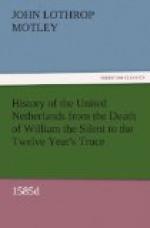“Aldegonde proposed,” said Parma, “that a garrison might be admissible if I made my entrance into the city merely with infantry and cavalry of nations which were acceptable—Walloons, namely, and Germans—and in no greater numbers than sufficient for a body-guard. I accepted, because, in substance, this would amount to a garrison, and because, also, after the magistrates shall have been changed, I shall have no difficulty in making myself master of the people, continuing the garrison, and rebuilding the citadel.”
The Prince proceeded to give his reasons why he was willing to accept the capitulation on what he considered so favourable terms to the besieged. Autumn was approaching. Already the fury of the storms had driven vessels clean over the dykes; the rebels in Holland and Zeeland were preparing their fleets—augmented by many new ships of war and fire-machines—for another desperate attack upon the Palisades, in which there was great possibility of their succeeding; an auxiliary force from England was soon expected; so that, in view of all these circumstances, he had resolved to throw himself at his Majesty’s feet and implore his clemency. “If this people of Antwerp, as the head, is gained,” said he, “there will be tranquillity in all the members.”
These reasons were certainly conclusive; nor is it easy to believe, that, under the circumstances thus succinctly stated by Alexander, it would have been impossible for the patriots to hold out until the promised succour from Holland and from England should arrive. In point of fact, the bridge could not have stood the winter which actually ensued; for it was the repeatedly expressed opinion of the Spanish officers in Antwerp, that the icebergs which then filled the Scheldt must inevitably have shattered twenty bridges to fragments, had there been so many. It certainly was superfluous for the Prince to make excuses to Philip for accepting the proposed capitulation. All the prizes of victory had been thoroughly secured, unless pillage, massacre, and rape, which had been the regular accompaniments of Alva’s victories, were to be reckoned among the indispensable trophies of a Spanish triumph.
Nevertheless, the dearth in the city had been well concealed from the enemy; for, three days after the surrender, not a loaf of bread was to be had for any money in all Antwerp, and Alexander declared that he would never have granted such easy conditions had he been aware of the real condition of affairs.
The articles of capitulation agreed upon between Parma and the deputies were brought before the broad council on the 9th August. There was much opposition to them, as many magistrates and other influential personages entertained sanguine expectations from the English negotiation, and were beginning to rely with confidence upon the promises of Queen Elizabeth. The debate was waxing warm, when some of the councillors, looking out of window of the great hall, perceived




